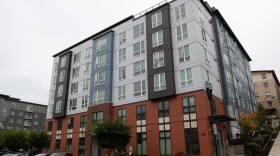Cities across Washington have struggled to address the homelessness crisis. One polarizing tactic: creating criminal penalties for people sleeping outside sanctioned encampments.
Auburn did it last year and Kent is considering something similar now. In Tacoma, the City Council narrowly approved a ban Tuesday night that covers 10 blocks around all six of the city’s sanctioned encampments.
If that 10-block radius cuts through a block or a public parcel, such as a park or a school, then the entire block or parcel is also included in the prohibited area, according to a news release.
The city announced that officials will work to “ensure that the least restrictive voluntary enforcement methods possible are used prior to enforcement of the ordinance.”
People who violate the new policy could face fines up to $250 and or up to a month in jail. The ban goes into effect Nov. 14. Three council members voted against it: Keith Blocker, Catherine Ushka and Kiara Daniels.
Supporters say it will help the city stand up more sanctioned shelters, making the prospect of hosting them more desirable. They also believe it will help encourage more people to seek out existing sanctioned shelters.
“While we have much more to do to address homelessness in Tacoma, I am proud that our City Council has taken this initial step to respond to the impacts of encampments across our community,” said Council Member John Hines, the primary sponsor who first introduced the ordinance last month.
“Since the beginning, I have been clear that the health and safety issues posed by encampments cannot be regarded in isolation from all that the City is doing on homelessness, and I remain committed to that work.”
Opponents argue it’s just going to cause more instability for unsheltered people while criminalizing them in the process.
“Camping bans don’t work,” Justin Camarata, the chair of the 27th Legislative District Democrats, said on Twitter following the vote. “Criminalizing the unhoused is immoral, period.”
Supporters acknowledged criminal penalties alone aren’t the solution. Experts agree.
“Enforcement might be a helpful tool, but it shouldn’t be your only tool,” said Oskar Rey, a legal consultant for the Municipal Research and Services Center, which helps local governments on policy issues like homelessness. “It has to be part of a broader package.”
Rey said that should include alternatives for shelter and social services, and the comprehensive approach to addressing homelessness should include a broad coalition of people within the city and the community it serves.
The ban’s sponsors said Tacoma is doing that.
“Looking ahead, this work will require further investments in shelter, services, and affordable housing, which the Council is committed to,” Hines said, according to the news release. “In partnership with my Council colleagues, community partners, and our residents, I will continue helping to connect our unhoused residents with the help they need.”






